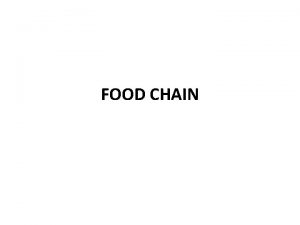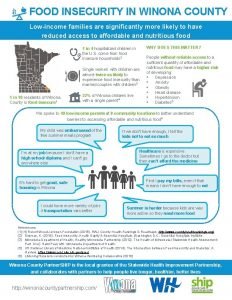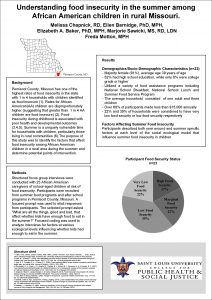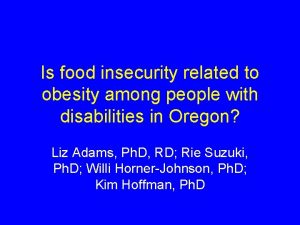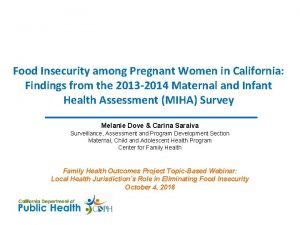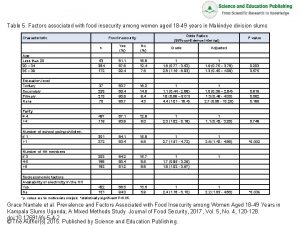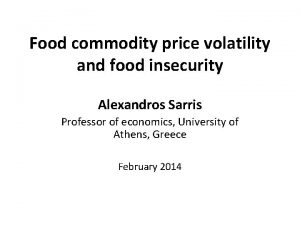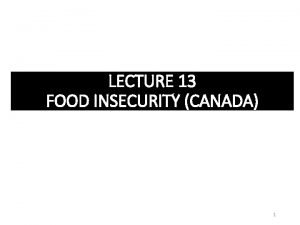FOOD INSECURITY AMONG LOWINCOME FIRSTTIME AFRICANAMERICAN MOTHERS Lauryn















- Slides: 15

FOOD INSECURITY AMONG LOWINCOME FIRST-TIME AFRICANAMERICAN MOTHERS Lauryn Whitfield, Dietetic Intern June 25, 2009

BACKGROUND: FOOD INSECURITY Definition � “Whenever the availability of nutritionally adequate and safe food, or the ability to acquire acceptable foods in socially acceptable ways, is limited or uncertain” Strongest Predictors � Psychosocial factors � Low-income levels � African-American � Being a single head of household � Having children

BACKGROUND: FUTURE HEALTH STATUS 2004: 15% overweight Increased BMI and risk of overweight in women Influences future eating behaviors � May tend to hoard food � African-American low-income first-time mothers more likely to enter pregnancy overweight, gain excessive gestational weight, and deliver a preterm infant of an infant small-for-gestational age

PURPOSE OF THE STUDY Understand characteristics associated with food insecurity among a cohort of young families at the highest risk for food insecurity Identify maternal and household characteristics that might distinguish household food-security status among this high-risk population Identify modifiable risk factors and resilient characteristics these households might display to overcome food insecurity

RESEARCHERS’ HYPOTHESES Women with younger age, less education, and signs of negative psychosocial factors would be associated with increased risk for household food insecurity Larger household size and presence of other adult members in the household are protective against household food insecurity

METHODS Data from Infant Care, Feeding, and Risk of Obesity 217 African-American mother-infant dyads (ages 18 -35) recruited through WIC clinics Demographic (household & caregiver), maternal & infant diet intake, maternal & infant anthropometrics, infant feeding styles, maternal depression & self-esteem, neighborhood safety Food security assessments were done at the 3 month (baseline) and 18 -month (endline) visits

STUDY VARIABLES Household Food Security � USDA Food Security Module six-item short form � Food secure-affirmative response to 0 questions � Marginally-affirmative response to 1 question � Food insecure-affirmative response to 2 or > questions Maternal Characteristics � Age, education, marital status, depressive symptoms, self-esteem levels Household Characteristics � 94% currently participates in WIC � 97% previously participated or were WIC eligible

STATISTICAL METHODS Descriptive statistics were conducted to examine the association between food security status and each of the independent variables using analysis of variance and Bonferroni correction for the continuous variables and x² tests for categorical variables

RESULTS Women in the study � 53% food secure � 34% marginally food insecure � 13% food insecure No significant difference between education, work history, or self-esteem Marriage less likely in food-insecure households Higher scores on depression scale Less likely to have grandmother in the house More likely to be nuclear households with smaller size

RESULTS Grandmother: decreased risk of food insecurity Father, depression: increased risk of food insecurity College degree: decreased risk of marginal food insecurity Depression: associated with marginal food security and food insecurity Self-esteem: decreased risk for both outcomes

DISCUSSION Education � Yrs. beyond h. s. decreased marginal food security Depression � African-American and Hispanic women have a higher prevalence of postpartum depressive symptoms (due to lower income, financial hardships, greater poor pregnancy outcomes) Grandmother � Assistance with material resources, support of feeding practices, child care, and increasing confidence

CONCLUSIONS WIC and other food and nutrition professionals should be aware of potential extenuating circumstances in the lives of low-income families and be prepared to refer clients for counseling Depressive symptoms in the presence of food insecurity can create insurmountable challenges to losing weight gained during pregnancy for some women: interventions might need to incorporate a stress reduction and/or psychosocial counseling component

IMPLICATIONS AND APPLICATION Small sample, recruited only through WIC � 40% WIC African-American (southeastern U. S. ) Income not obtained � Assume at or below 185% income-to-poverty Covariates multifactorial � Socioeconomic, demographic, household composition, psychosocial Future research � Household composition and structure � Grandmother vs. father and food insecurity risk

REFERENCES Laraia BA, Borja JB, Bentley ME. Grandmothers, Fathers, and Depressive Symptoms Are Associated with Food Insecurity among Low-Income First-Time African-American Mothers in North Carolina. J Am Diet Assoc. 2009; 109: 1042 -1047.

ANY QUESTIONS? Thank you for your attention!
 Africanamerican inventors
Africanamerican inventors Lauryn white
Lauryn white Lauryn himl
Lauryn himl Unit 2 food food food
Unit 2 food food food Food chain sequence
Food chain sequence Happy godmothers day gif
Happy godmothers day gif Who said younger than she are happy mothers made
Who said younger than she are happy mothers made Your mother's perfume poem
Your mother's perfume poem Expectation prayer points
Expectation prayer points Turkish fathers day
Turkish fathers day Happy sad poems
Happy sad poems Thank god for mothers
Thank god for mothers 2006 mothers day
2006 mothers day Happy mother's day in chinese
Happy mother's day in chinese Two mothers one on one
Two mothers one on one Tracing family descent through mothers rather than fathers
Tracing family descent through mothers rather than fathers




